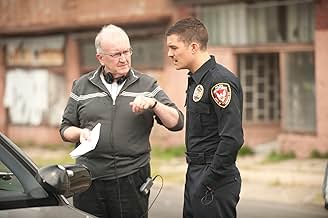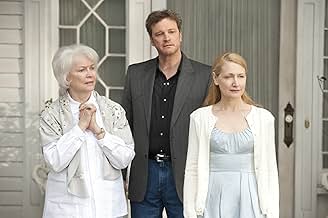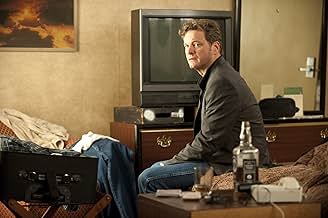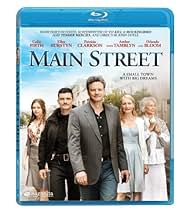Ajouter une intrigue dans votre langueDurham is slowly dying like the tobacco business it once depended on. Leroy comes to Durham with a business plan. He rents an old warehouse from a cash-strapped old tobacco heiress.Durham is slowly dying like the tobacco business it once depended on. Leroy comes to Durham with a business plan. He rents an old warehouse from a cash-strapped old tobacco heiress.Durham is slowly dying like the tobacco business it once depended on. Leroy comes to Durham with a business plan. He rents an old warehouse from a cash-strapped old tobacco heiress.
- Récompenses
- 1 nomination au total
Avis à la une
Durham, North Carolina is the setting - a town shrinking by the year because of lack of jobs and crumbling businesses - and the major (Isiah Whitlock Jr.) is desperate, deciding whether to schedule or move or cancel the annual parade from Thanksgiving to Christmas due to the town's lack of interest and depression. Enter Gus Leroy (Colin Firth) who has rented a defunct tobacco warehouse from a town widow Georgiana Carr (Ellen Burstyn) to store canisters of Hazardous Waste awaiting transport to Vernon, Texas for burying: Leroy's apparent Ecology informed company offers the Durham city council the opportunity for economic resurrection. Georgiana has misgivings about the rental and is faced with the fact that her trust fund form her wealthy father is depleted and she must consider selling the mansion in which she has lived since her birth. She seeks advice form her niece Willa (Patricia Clarkson) who at first objects but on meeting Leroy falls for the man and the project. As a sidebar another family faces changes: young Mary Saunders (Amber Tamblyn) is under the spell of her boss (Andrew McCarthy) but still loves her high school sweetheart Harris (Orlando Bloom), a young cop who is studying law at night and living with his depressed mother (Margo Martindale), urging Harris to 'go steady' with Mary and forget law school to stay in Durham. The human factor enters: there is an accident of one truck hauling canisters (and event that changes the outlook of the wannabe entrepreneur Leroy), Mary's boss is married, and the concept of 'progress' in the decaying town of Durham changes along with the changes in the folk involved in the story.
Aside from failing to involve the audience in the story or the characters, the conundrum is why would such a stellar cast of brilliant actors (Colin Firth, Patricia Clarkson, Ellen Burstyn, Orlando Bloom) sign on for such an obvious box office disaster (it is yet to be released)? One can only assume that it was an homage to the memory of the brilliant writer Horton Foote. It is a shame this screenplay is the last note of the legacy he left us.
Grady Harp
No, what I want to address is the portrayal of my hometown, to which I chose to move and in which I have lived for the past twenty-five years. At the risk of sounding like Joe the Civic Booster, the city of Durham portrayed in MAIN STREET bears only faint, surface resemblance to the actual place. Anyone who manages to sit through this movie should NOT think they've learned much about the actual Durham. For one thing, Durham is not a small town but a city of more than 200,000 residents, part of a larger metropolitan area (Wake, Durham, and Orange counties) exceeding 2 million.
Yes, downtown Durham is struggling. It was struggling before the Great Recession and it continues to struggle with reinvigorating itself as a vital city center. It needs more retail businesses, more reasons for the suburban middle-class to come downtown and enjoy the urban ambiance. In that respect, it's hardly alone among U.S. cities, small and large. Other parts of Durham – notably, the older working class neighborhoods within a mile or so of downtown – also are hurting.
The downtown area is only part of the city. Moreover, downtown Durham has snapped back in the past few years. At least as far back as the early 1980s, old tobacco industry structures in the inner city were being rehabbed. Durham held its last tobacco market (where farmers would auction off their crop) in 1986, and the huge American Tobacco complex closed the following year. By 2001, the last cigarette plant in the city (Liggett Group) had gone. In the past decade, despite a slow start and the general downturn of the U.S. economy, many downtown buildings have been renovated and repurposed as residential, office, and retail spaces, or are in the process. The old tobacco warehouse district has become the Durham Central Park, and there is a growing bar and restaurant scene downtown.
Downtown Durham also is the site of much new construction over the past two decades, including the Durham Bulls Athletic Park, the Durham Performing Arts Center, the new urban transit center and a new Durham County legal complex. There's a big, modern Marriott hotel and convention center there, too, rather than the seedy little hotel in which Gus LeRoy stayed in the film. New, privately funded construction has complemented the new public structures, as well as refurbished buildings that originated in the early 20th century and before (such as the Carolina Theater, where MAIN STREET was shown here).
As I said, downtown is only part of Durham. MAIN STREET makes no mention of Durham's two thriving universities. Duke, with its world-class medical center, is the city's largest employer. N.C. Central University is regarded as a leader among the nation's historically black state universities. (Harris Parker, the cop in MAIN STREET, could have been attending NCCU's School of Law, one of six university law schools in North Carolina and the only one where a student can earn a law degree at night while working his or her day job.) The film also makes no mention of Research Triangle Park, which since the 1960s has been providing jobs for thousands of residents of Durham and other nearby counties at such employers as GlaxoSmithKline, Cisco, Merck, BASF, Intel, and the National Institute for Environmental Health Sciences, as well as at IBM's largest U.S. operation. The city has numerous suburban residential developments and shopping areas as well as several well-preserved old neighborhoods and commercial districts closer to downtown.
Durham is well-integrated into the metropolitan area known as the Research Triangle. Raleigh, Chapel Hill, Cary, Carrboro, UNC-Chapel Hill, N.C. State University are indeed nice places for Durham residents to visit -- as well as places where many of them work --and relatively easy to get to. I missed MAIN STREET when it opened in Durham, but I caught it at a theater in Cary, an easy thirty-minute drive from my Durham home.
Please – I know I sound like a Chamber of Commerce flack (which I am not), but Durham is NOT some isolated urban hellhole full of desperate, blue-collar types and faded aristocrats lamenting the passing of the city's tobacco heyday and wondering where their next job is coming from. Unfortunately, there are several other small cities and towns in North Carolina that resemble the Durham of MAIN STREET, places whose former textile and furniture mills have gone overseas and left downtowns devastated, hungry for industry and development. Durham is always after new companies and more jobs as well – especially in the current economy – but, again, it only vaguely resembles the city depicted in MAIN STREET. And, believe me, if Gus LeRoy came to town proposing to truck "hazardous waste" from Louisiana to Texas via Durham (?), the public outcry would be deafening.
"Main Street" revolves around an old lady, played expertly by Ellen Burstyn. She is broke and has to either sell the house or to lease her warehouse. Her fragile mental state and her internal struggle about what is right to do are well portrayed. "Main Street" has an engaging plot, characters are developed well, so viewers get to care for every character. The only drawback is that the budget seems to have gone to the cast, with almost nothing left for the technical equipment. Anyway, "Main Street" is still an enjoyable and engaging drama.
Le saviez-vous
- AnecdotesThe black-and-white shots that appear in the opening minute were made in Durham, N.C., in the late 1930s by H. Lee Waters (1902-1997), an itinerant photographer from Lexington, N.C. During the later years of the Great Depression, Waters earned money by visiting more than one hundred towns in North Carolina and surrounding states and shooting 16mm film of everyday scenes and people. He would arrange to exhibit his films in a local theater where the movies were shot. In an era when movie camera ownership was rare, and long before home video cameras became common, people would flock to the theaters to see themselves and their neighbors in moving pictures. Many of Waters's films have been collected and archived in North and South Carolina. One of his films, made in Kannapolis, N.C. in 1941, was added to the National Film Registry in 2005. Other samples of his work can be seen in "The Cameraman Has Visited Our Town" on folkstreams.net.
- GaffesGeorgiana is talking to one of the workers at the warehouse and says that tobacco used to be ground up and there would be tobacco dust floating through the town, turning people's skin brown. While tobacco was processed in town, and you could smell the leaves, dust did not float through town.
- Citations
Harris Parker: This city like many in America, has come to a rough moment in its history. A city after all is just a collection of houses and buildings, hopes and dreams that depend on the fortune and determination and fate of its residents. The future, uncertain at best can be fearful or full of promise. It's all in how you see it..."
- ConnexionsFeatured in WatchMojo: Top 10 Worst American Accents by Non-Americans (2016)
Meilleurs choix
- How long is Main Street?Alimenté par Alexa
Détails
- Date de sortie
- Pays d’origine
- Sites officiels
- Langue
- Aussi connu sous le nom de
- Calle principal
- Lieux de tournage
- Sociétés de production
- Voir plus de crédits d'entreprise sur IMDbPro
Box-office
- Budget
- 10 000 000 $US (estimé)
- Montant brut aux États-Unis et au Canada
- 2 560 $US
- Week-end de sortie aux États-Unis et au Canada
- 1 553 $US
- 11 sept. 2011
- Montant brut mondial
- 26 011 $US
- Durée1 heure 32 minutes
- Couleur
- Mixage
- Rapport de forme
- 2.35 : 1





















